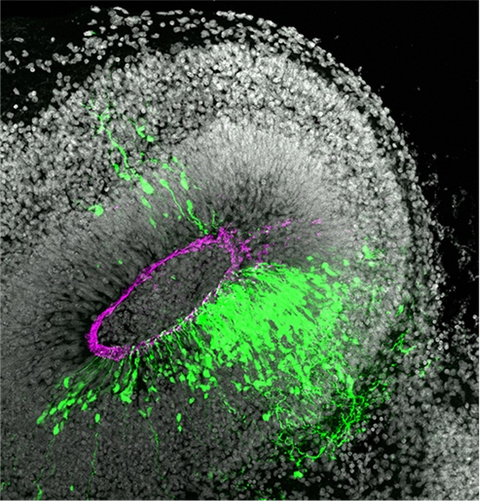Dec 17, 2021
New Funding for International Research Projects on Microcephaly

A human brain organoid as seen under the microscope. Single cell nuclei are visible in grey and tight junctions lining the organoid ventricle in magenta. Electroporation (green cells) allows to deliver genome and epigenome editing tools to human neural progenitor cells for functional analysis.
Some humans are born with abnormally small brains, a medical condition known as microcephaly, leading to cognitive and motor impairment. But why exactly are their brains smaller? The new international research consortium sets out to explore whether cellular metabolism plays a role in the disease. The initiative was funded with over 1.17 million euros within the ERA-NET NEURON program. Dr. Mareike Albert from the Center for Regenerative Therapies Dresden (CRTD) at the TU Dresden will contribute with a set of projects exploring the interplay between metabolism and epigenetics in brain development.
In the developing fetus, a pool of stem cells, known as neural progenitor cells, expands during pregnancy and gives rise to almost all the cells in the brain. In the case of microcephaly, the researchers believe that the neural progenitor cells expand improperly and do not produce enough brain cells. In many cases, the exact mechanism of the disease is still largely unclear. Although some genetic mutations have been associated with microcephaly, a large proportion of patients do not carry any known mutations. Now, the ERA-NET NEURON program funded the new international research consortium that sets out to explore the causes of microcephaly in an effort to improve early diagnostic strategies.
“Recent research links microcephaly to changes in cellular metabolism, a set of processes that produce energy and cellular building blocks,” explains Dr. Mareike Albert, research group leader at the Center for Regenerative Therapies Dresden (CRTD) at the TU Dresden. The new consortium combines the expertise of scientists from Germany, Finland, Belgium, and France, to focus on identifying and characterizing the metabolic pathways that control the expansion of neural progenitors.
Dr. Albert’s team will coordinate a set of experiments that specifically focus on the connection between metabolism and epigenetics. “We know that cellular metabolism plays an important role in regulating epigenetic modifications, small chemical modifications on DNA and on structural proteins associated with DNA that alter gene expression. The impaired metabolism could lead to changes in gene expression and ultimately affect the cell fate, e.g., resulting in a smaller number of progenitor cells giving rise to neurons” explains Dr. Albert.
The Albert research group at the CRTD examines epigenetic mechanisms that regulate brain development and evolution. The group uses cutting-edge approaches, including culturing human brain organoids, developing epigenome editing tools, and using quantitative analyses of gene expression and epigenetic modifications.
About ERA-NET NEURON
European Research Area Networks (ERA-NETs) are projects initiated by the European Commission in various research fields. Their goal is to create a European Research Area in which research is conducted and funded across countries, allowing research groups to jointly work on specific problems, exchange ideas, and benefit from cross-border expertise and mobility. 27 research funding organizations and ministries from 23 countries participate in ERA-NET NEURON (Network of European Funding for Neuroscience Research) to support basic, clinical, and translational research in the diverse field of research into the brain and its diseases.
